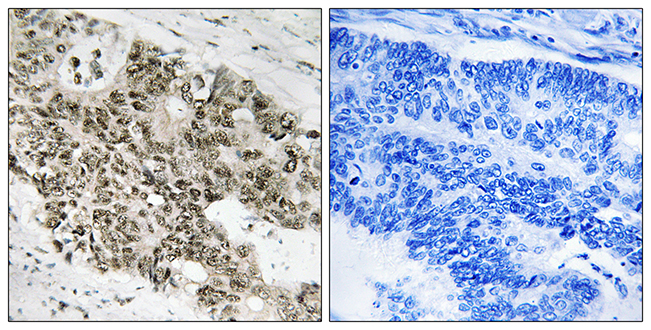ATR antibody
GTX128146
ApplicationsImmunoFluorescence, ImmunoPrecipitation, Western Blot, ImmunoCytoChemistry, ImmunoHistoChemistry, ImmunoHistoChemistry Paraffin
Product group Antibodies
ReactivityHuman, Mouse
TargetATR
Overview
- SupplierGeneTex
- Product NameATR antibody
- Delivery Days Customer9
- Application Supplier NoteWB: 1:500-1:3000. ICC/IF: 1:100-1:5000. IHC-P: 1:100-1:1000. IP: 1:100-1:500. *Optimal dilutions/concentrations should be determined by the researcher.Not tested in other applications.
- ApplicationsImmunoFluorescence, ImmunoPrecipitation, Western Blot, ImmunoCytoChemistry, ImmunoHistoChemistry, ImmunoHistoChemistry Paraffin
- CertificationResearch Use Only
- ClonalityPolyclonal
- Concentration1 mg/ml
- ConjugateUnconjugated
- Gene ID545
- Target nameATR
- Target descriptionATR checkpoint kinase
- Target synonymsFCTCS, FRP1, MEC1, SCKL, SCKL1, serine/threonine-protein kinase ATR, ATR serine/threonine kinase, FRAP-related protein-1, MEC1, mitosis entry checkpoint 1, homolog, ataxia telangiectasia and Rad3-related protein
- HostRabbit
- IsotypeIgG
- Protein IDQ13535
- Protein NameSerine/threonine-protein kinase ATR
- Scientific DescriptionThe protein encoded by this gene belongs the PI3/PI4-kinase family, and is most closely related to ATM, a protein kinase encoded by the gene mutated in ataxia telangiectasia. This protein and ATM share similarity with Schizosaccharomyces pombe rad3, a cell cycle checkpoint gene required for cell cycle arrest and DNA damage repair in response to DNA damage. This kinase has been shown to phosphorylate checkpoint kinase CHK1, checkpoint proteins RAD17, and RAD9, as well as tumor suppressor protein BRCA1. Mutations of this gene are associated with Seckel syndrome. An alternatively spliced transcript variant of this gene has been reported, however, its full length nature is not known. Transcript variants utilizing alternative polyA sites exist. [provided by RefSeq]
- ReactivityHuman, Mouse
- Storage Instruction-20°C or -80°C,2°C to 8°C
- UNSPSC12352203
References
- Igarashi T, Mazevet M, Yasuhara T, et al. An ATR-PrimPol pathway confers tolerance to oncogenic KRAS-induced and heterochromatin-associated replication stress. Nat Commun. 2023,14(1):4991. doi: 10.1038/s41467-023-40578-2Read this paper
- Lin RC, Chao YY, Lien WC, et al. Polo‑like kinase 1 selective inhibitor BI2536 (dihydropteridinone) disrupts centrosome homeostasis via ATM‑ERK cascade in adrenocortical carcinoma. Oncol Rep. 2023,50(3):pii: 167. doi: 10.3892/or.2023.8604.Read this paper
- Su YL, Xiao LY, Huang SY, et al. Inhibiting WEE1 Augments the Antitumor Efficacy of Cisplatin in Urothelial Carcinoma by Enhancing the DNA Damage Process. Cells. 2023,12(11). doi: 10.3390/cells12111471Read this paper
- Lee YP, Lin CR, Chen SS, et al. Combination treatment of cordycepin and radiation induces MA-10 mouse Leydig tumor cell death via ROS accumulation and DNA damage. Am J Cancer Res. 2023,13(4):1329-1346.Read this paper
- Batnini K, Houles T, Kirsh O, et al. Multi-Level Control of the ATM/ATR-CHK1 Axis by the Transcription Factor E4F1 in Triple-Negative Breast Cancer. Int J Mol Sci. 2022,23(16). doi: 10.3390/ijms23169217Read this paper
- Kurashima K, Kashiwagi H, Shimomura I, et al. SMARCA4 deficiency-associated heterochromatin induces intrinsic DNA replication stress and susceptibility to ATR inhibition in lung adenocarcinoma. NAR Cancer. 2020,2(2):zcaa005. doi: 10.1093/narcan/zcaa005Read this paper
- Andersson MK, Mangiapane G, Nevado PT, et al. ATR is a MYB regulated gene and potential therapeutic target in adenoid cystic carcinoma. Oncogenesis. 2020,9(1):5. doi: 10.1038/s41389-020-0194-3Read this paper
- Velichko AK, Petrova NV, Luzhin AV, et al. Hypoosmotic stress induces R loop formation in nucleoli and ATR/ATM-dependent silencing of nucleolar transcription. Nucleic Acids Res. 2019,47(13):6811-6825. doi: 10.1093/nar/gkz436Read this paper


